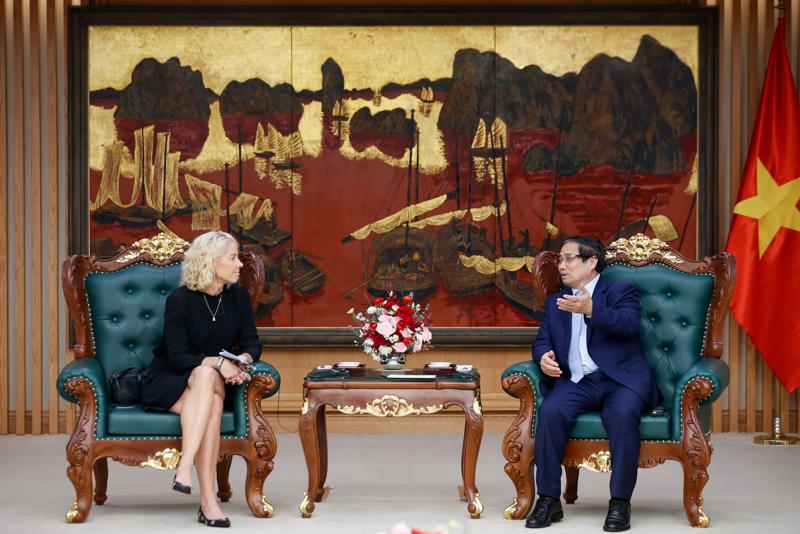At a meeting with Prime Minister Pham Minh Chinh on April 23, Ms. Susanna Campbell, Chairwoman of Sweden-based SYRE Group, announced that the company plans to invest approximately $1 billion in a textile recycling complex in South-central Binh Dinh province.
A subsidiary of fashion retailer H&M Group and tech investment firm Vaảga, SYRE specializes in recycling textile waste and aims to build a global circular textile ecosystem through large-scale, high-tech recycling hubs powered by renewable energy.
The planned polyester textile recycling complex is designed with an annual capacity of up to 250,000 tons. The project is scheduled to begin operations by the end of 2028, with the ambition of making Vietnam the world’s first high-tech, circular textile hub that meets both U.S. and EU standards.
According to Ms. Campbell, SYRE plans to establish major recycling complexes in key global regions, with Vietnam identified as a strategic location.
During the meeting, Prime Minister Pham Minh Chinh praised the project for its alignment with green and clean production principles and its focus on recycling textile waste, contributing positively to environmental protection. He emphasized that SYRE's investment fits with Vietnam’s broader development orientation of diversifying markets, products, and supply chains to adapt to evolving global challenges.
The Prime Minister noted that Binh Dinh offers an excellent investment environment, already established as a center for clean energy—including wind and solar power—and equipped with well-developed infrastructure, including expressways, an international airport, and a deep-sea port. The province also benefits from favorable climate and environmental conditions.
He requested close cooperation between SYRE, Binh Dinh authorities, and relevant ministries throughout the project's implementation. He also instructed the Ministries of Finance, Industry and Trade, and Agriculture and Environment to provide procedural guidance and assist the local government in resolving any issues faced by the investor.
Prime Minister Chinh further urged SYRE to prioritize using domestic green materials such as lotus fiber and jute, and to explore the use of fabric scraps and discarded clothing generated within Vietnam as input materials for production.
In response, Ms. Campbell and SYRE executives expressed strong confidence in Vietnam’s potential to become a global leader in circular economy development. They stated that Vietnam was selected as a strategic investment destination due to its growing green energy sector and strong textile industry. SYRE committed to maximizing the use of local materials and strengthening domestic supply chains and production.
Also at the meeting, Swedish Ambassador Johan Ndisi affirmed that Swedish companies are eager to build long-term partnerships in Vietnam. He proposed enhanced cooperation in green transition initiatives and suggested that Sweden and Vietnam elevate their relationship to a comprehensive strategic partnership focused on science, technology, innovation, and digital transformation.









 Google translate
Google translate